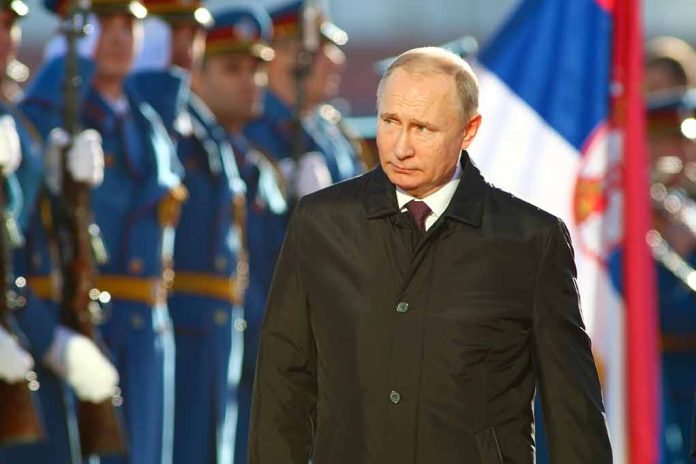
Russia’s condemnation of Israel’s strikes on Iran’s nuclear facilities exposes the deepening global rift as Putin positions himself as a potential Middle East peacemaker while protecting his strategic partnership with Tehran.
Key Takeaways
- Russia has officially labeled Israel’s strikes on Iran’s nuclear facilities and military leadership as “unprovoked” and “unacceptable,” claiming they violate international law
- The attacks targeted Iran’s nuclear complex and killed senior Iranian military figures who have been supplying Russia with drone technology for its war in Ukraine
- Putin has suggested Russia could help manage Iran’s nuclear program by exporting Iran’s nuclear material for conversion into reactor fuel
- The timing of the strikes coincided with an International Atomic Energy Agency meeting and upcoming US-Iran nuclear negotiations
- Russia and Iran maintain a strategic partnership, though it lacks mutual defense commitments that would obligate Moscow to defend Tehran militarily
Russia Condemns Israel’s “Unprovoked” Actions
The Russian Foreign Ministry has issued a stern rebuke of Israel’s recent military operations against Iran’s nuclear facilities and military installations. In an official statement, Moscow characterized the attacks as a direct violation of international norms and the sovereignty of a United Nations member state. The timing of these strikes has raised significant concerns, as they occurred during an International Atomic Energy Agency meeting and shortly before scheduled US-Iran nuclear negotiations, potentially derailing diplomatic efforts to address Iran’s nuclear program through peaceful means.
“Unprovoked military strikes against a sovereign UN member state, its citizens, peaceful sleeping cities, and nuclear energy infrastructure are categorically unacceptable,” stated the Russian Foreign Ministry.
Russia’s Foreign Ministry has condemned Israel’s overnight airstrikes on Iran as “unprovoked” and “unacceptable”, and called for both sides to act with restraint in order to prevent the further escalation of tensions in the Middle East.
🔗 | https://t.co/PlzD7zwi3t pic.twitter.com/kryeBLbONy
— Novaya Gazeta Europe (@novayagazeta_en) June 13, 2025
Strategic Implications for Russia-Iran Partnership
The Israeli strikes have significant implications for Russia’s strategic relationship with Iran. Tehran has been a crucial partner for Moscow, particularly during its ongoing military operations in Ukraine. Iranian-supplied drones have bolstered Russia’s offensive capabilities, making the targeting of Iranian military leadership particularly problematic for Russian interests. The attacks also coincide with President Trump’s recent discussions with Putin regarding Iran’s nuclear ambitions, creating a complex diplomatic landscape where Russia must balance its relationships with both Israel and Iran.
“I stated to President Putin that Iran cannot have a nuclear weapon, and, on this, I believe that we agreed. President Putin suggested that he would participate in the discussions with Iran and that he could, perhaps, help get this brought to a rapid conclusion,” said Donald Trump.
The Kremlin’s response highlights a calculated attempt to position Russia as a rational actor in regional affairs. By offering to export and process Iranian nuclear material into reactor fuel, Putin appears to be stepping into a mediator role. This proposal serves dual purposes: it potentially limits Iran’s capacity to develop weapons-grade uranium while allowing Russia to maintain influence over Tehran’s nuclear program, essentially placing Moscow at the center of any future negotiations about Middle Eastern security architecture.
Limited Defense Commitments and Broader Regional Responses
Despite Russia’s strong rhetoric condemning Israel’s actions, experts note that Moscow’s strategic partnership with Tehran does not include mutual defense commitments. This critical distinction limits Russia’s obligation to defend Iran militarily, allowing Putin flexibility in his response to the situation. The strategic relationship between Russia and Iran differs significantly from Moscow’s defense pacts with North Korea and Belarus, which include explicit security guarantees that would trigger Russian intervention in case of external aggression.
Regional responses to Israel’s actions have been mixed. Armenia, Azerbaijan, and Turkey have joined Russia in condemning the strikes, emphasizing the importance of adhering to international law and resolving conflicts through diplomatic channels. Meanwhile, Ukraine has taken a different stance, criticizing Iran for its support of Russia’s military operations and categorizing Tehran as part of a coalition of aggressive regimes. These divergent positions reflect the complex web of alliances and conflicts that define Middle Eastern and Eastern European geopolitics.
Protecting Nuclear Infrastructure and Global Security
A particular concern emphasized in Russia’s condemnation is the targeting of nuclear energy infrastructure. Moscow’s statement highlighted the need to protect such facilities, not only for Iran’s sovereignty but for broader regional and global security. The potential for environmental catastrophe or radiation exposure resulting from attacks on nuclear sites represents a genuine threat that extends beyond immediate military objectives. By focusing on this aspect, Russia is attempting to frame Israel’s actions as reckless and dangerous to international security.
Russia’s forceful response also serves to counter what it perceives as Western complicity in Israel’s military operations. The Foreign Ministry specifically criticized Western nations for provoking anti-Iran sentiment and creating conditions that enabled the strikes. This narrative fits into Russia’s broader geopolitical strategy of positioning itself as a defender of state sovereignty against Western interventionism, especially as Moscow continues to face international criticism for its military actions in Ukraine and elsewhere.
As tensions continue to escalate, President Putin’s potential role as a mediator remains uncertain. With deep ties to both Israel and Iran, Russia occupies a unique position that could either facilitate diplomatic resolution or further complicate an already volatile situation. The outcome will depend on Moscow’s ability to leverage its relationships while balancing its strategic interests in a region where miscalculations could lead to wider conflict with global implications.




